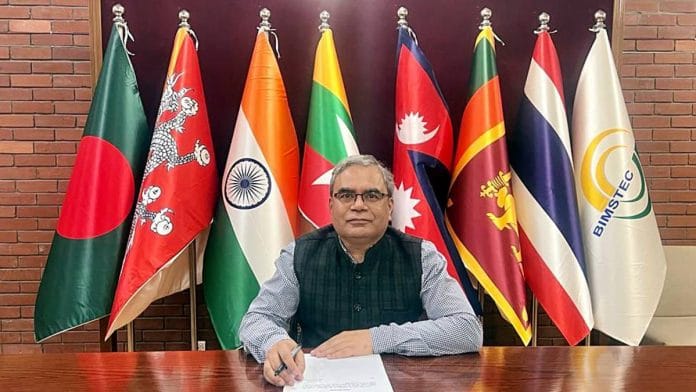Bangkok: India and the BIMSTEC members will agree to a roadmap for a free trade agreement (FTA) as part of the group’s ‘Bangkok Vision 2030’ document, said Indra Mani Pandey, Secretary General of BIMSTEC, to ThePrint in an exclusive interview Wednesday.
“Our BIMSTEC Vision 2030 does provide a roadmap for early completion of negotiations to have constituent agreements of the BIMSTEC free trade agreement negotiated. We have six working groups negotiating constituent agreements in trade in goods, in services, also promotion of investment, customs cooperation, trade facilitation, disputes settlement and other legal issues,” said Pandey.
The BIMSTEC (Bay of Bengal Initiative for Multi-Sectoral Technical and Economic Cooperation) member-states, Bangladesh, Bhutan, India, Myanmar, Nepal, Sri Lanka and Thailand, are set to adopt the ‘Bangkok Vision 2030’ at the leaders’ summit Friday.
Prime Minister Narendra Modi will travel to Bangkok Thursday, have a bilateral meeting with Thai Prime Minister Paetongtarn Shinawatra and attend the BIMSTEC summit Friday, before departing for Sri Lanka.
According to the Secretary General of BIMSTEC, there has been “progress” in the meetings of the six working groups, and the conclusion of the negotiations would improve regional trade.
The idea of a BIMSTEC Free Trade Area was first agreed to in 2004, when the member-states signed a framework agreement in Phuket, Thailand. However, by including a roadmap within its vision for the next five years, there is an indication of positive momentum towards an early completion.
The organisation in recent years has taken steps to build its institutions, with the charter coming into force in May 2024, giving it an international legal personality. It allows the organisation to potentially expand by adding members.
“Since enforcement of our charter, there is certainly a provision for admission of observers and even new members. But there has been no discussion among the member-states on whether there is any desire to have observers. I think BIMSTEC has been focused on consolidating regional cooperation and to make sure that mechanisms are in place and we are able to have tangible cooperation on the ground,” said Pandey.
The current members are moving towards signing a number of agreements at the Bangkok summit, including one on maritime transport cooperation. The other major pact is the rules of procedure, to further lay the institutional framework for the organisation.
Also Read: ‘Every region must look out for itself,’ says Jaishankar at BIMSTEC, as Trump unveils global tariffs
Maritime agreement to enhance infrastructure & connectivity
One of the key pacts due for signing Thursday morning is on maritime transport cooperation. For five of the seven member-states, the Bay of Bengal is an important maritime connection. Both Nepal and Bhutan are land-locked and rely on India for economic trade activities.
“As far as the maritime domain is concerned, this particular agreement is aimed at enhancing maritime connectivity within the region. The importance of maritime connectivity for a region, which is a maritime space, cannot be overstressed. What this agreement tries to do is to enhance access for all member-states, and cooperation among the ports,” said Pandey.
“It will also look at enhancing the infrastructure itself for the member-states… by addressing some of the fundamental issues, which are impacting maritime connectivity, this agreement will contribute in enhancing that,” he added.
For India, the maritime pact comes just as Bangladesh’s Chief Adviser Muhammad Yunus commented on the land-locked nature of India’s northeastern states, during a visit to China last week. India has proposed a maritime centre of excellence as part of BIMSTEC to help improve cooperation between the member-states.
The grouping’s ambitions are also aimed at land connectivity, energy connectivity and digital connectivity projects. The India-Myanmar-Thailand Trilateral Highway is one such project, focussing on the establishment of a transport corridor connecting Thailand’s Mae Sot with Moreh in India’s Manipur.
However, the trilateral highway has faced a number of challenges emanating from the domestic situation in Myanmar, which has been in the midst of a civil war for the last four years. At a bilateral level, India has been moving forward with digital connectivity projects, rolling out its unified payments interface (UPI) in Nepal, Bhutan and Sri Lanka. It has also offered its digital public infrastructure to other members of the grouping.
The summit will also see BIMSTEC signing a memorandum of understanding with the Indian Ocean Rim Association (IORA) and the United Nations Office on Drugs and Crime (UNODC), which indicates its intention to further developmental partnerships with external organisations.
(Edited by Nida Fatima Siddiqui)
Also Read: India-Myanmar-Thailand highway — final piece of the puzzle in New Delhi’s Atlantic to Pacific push






